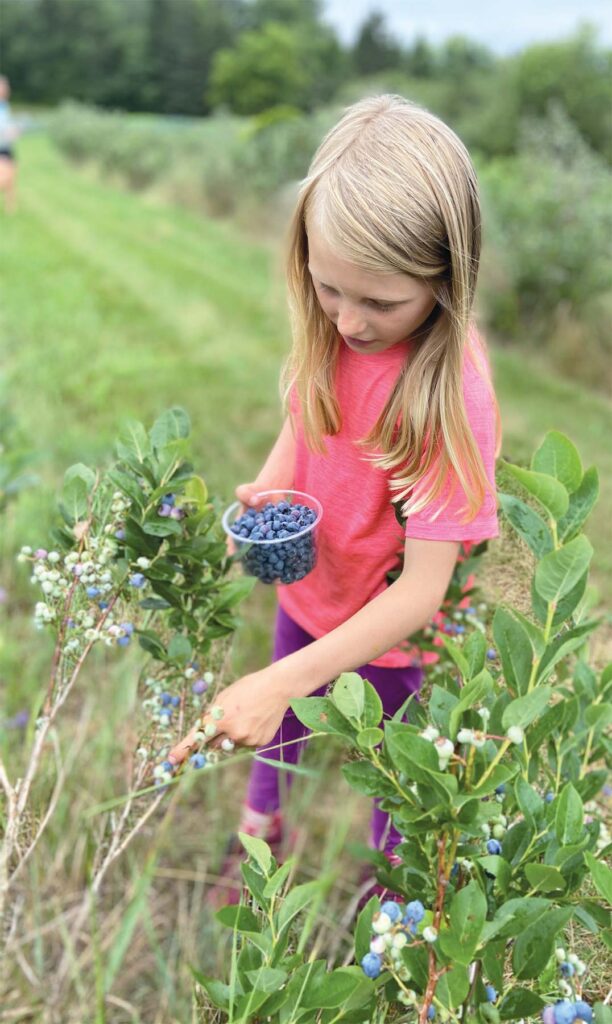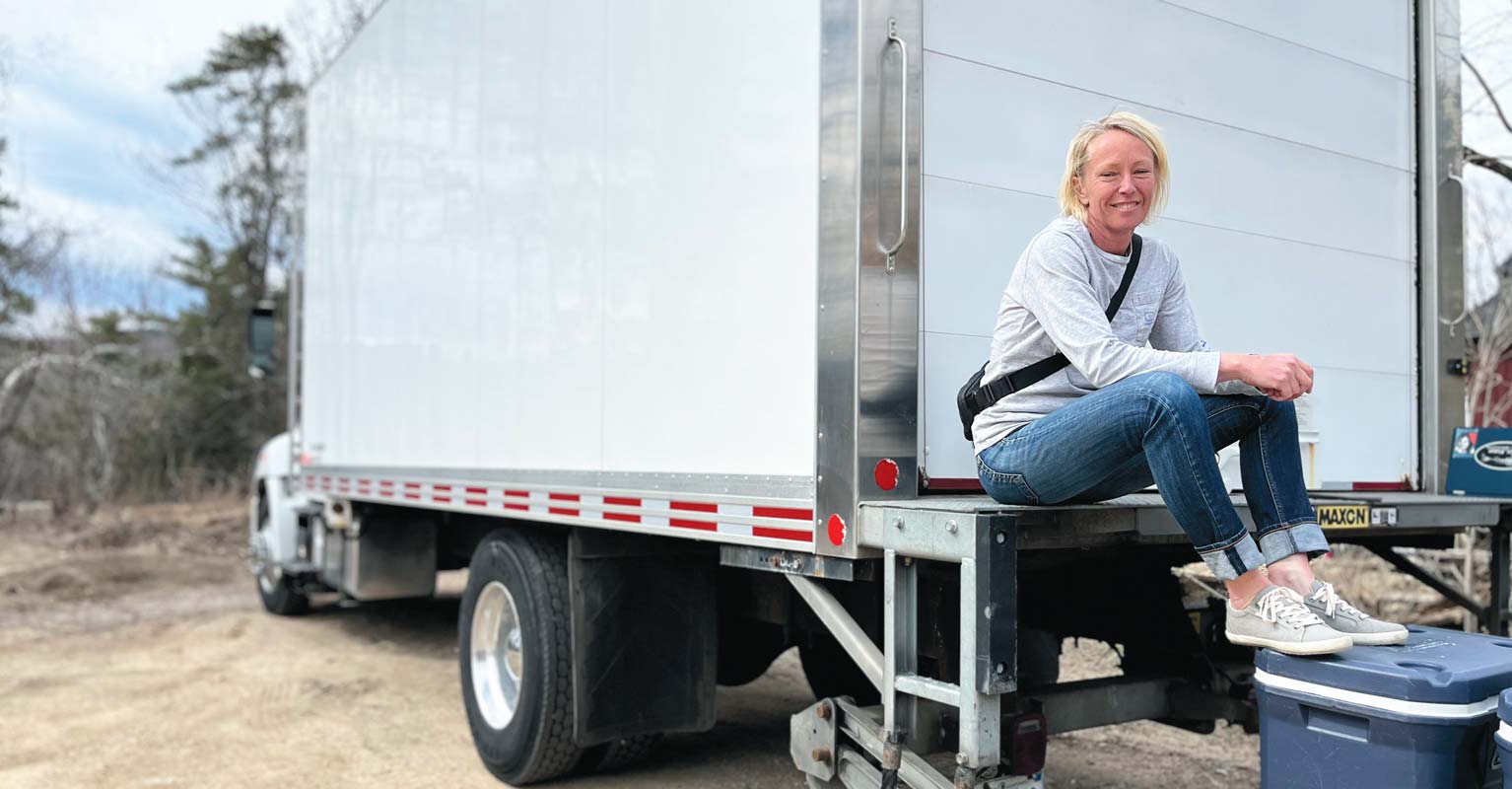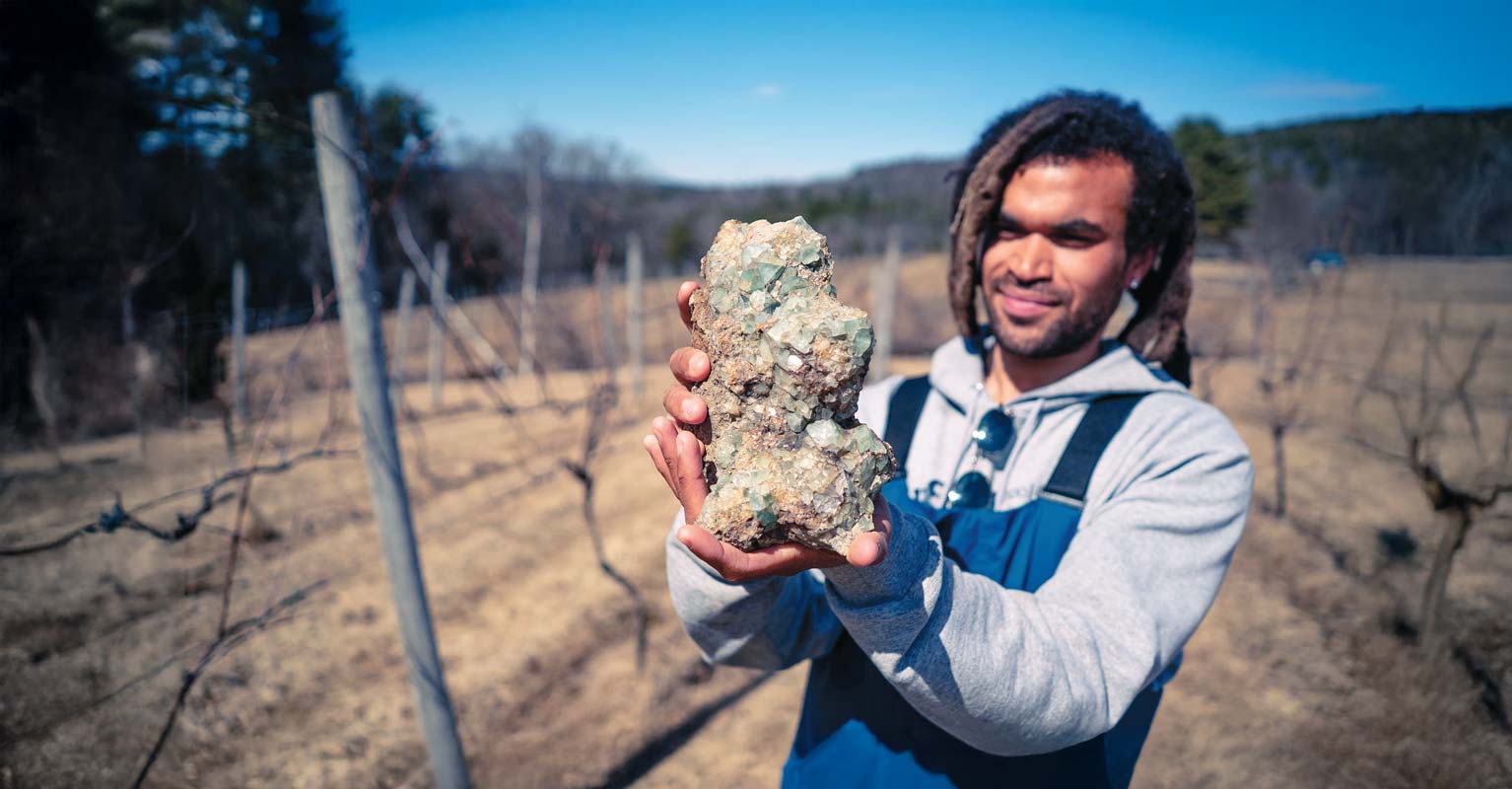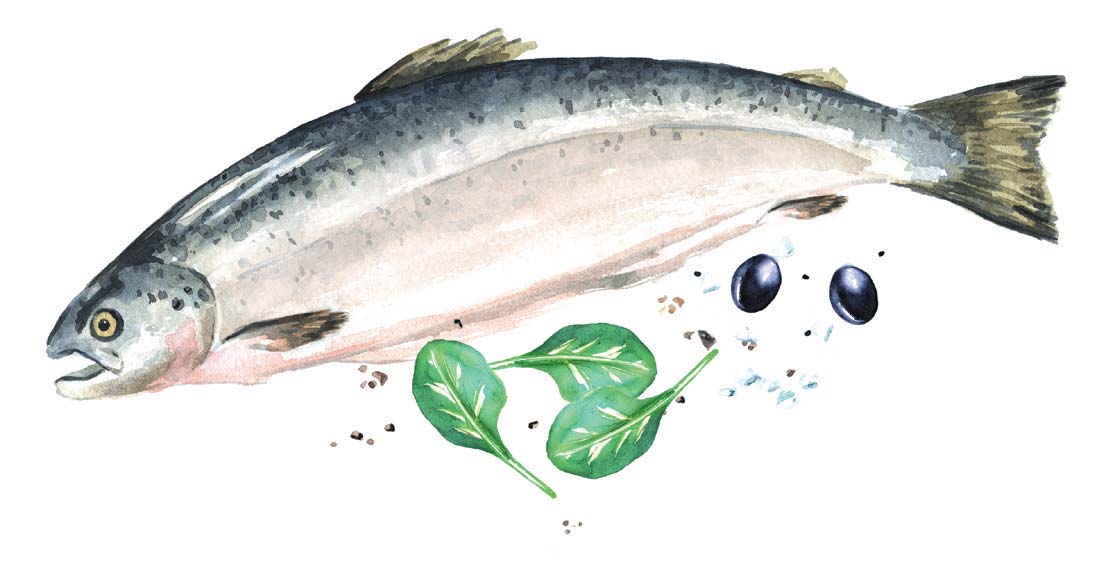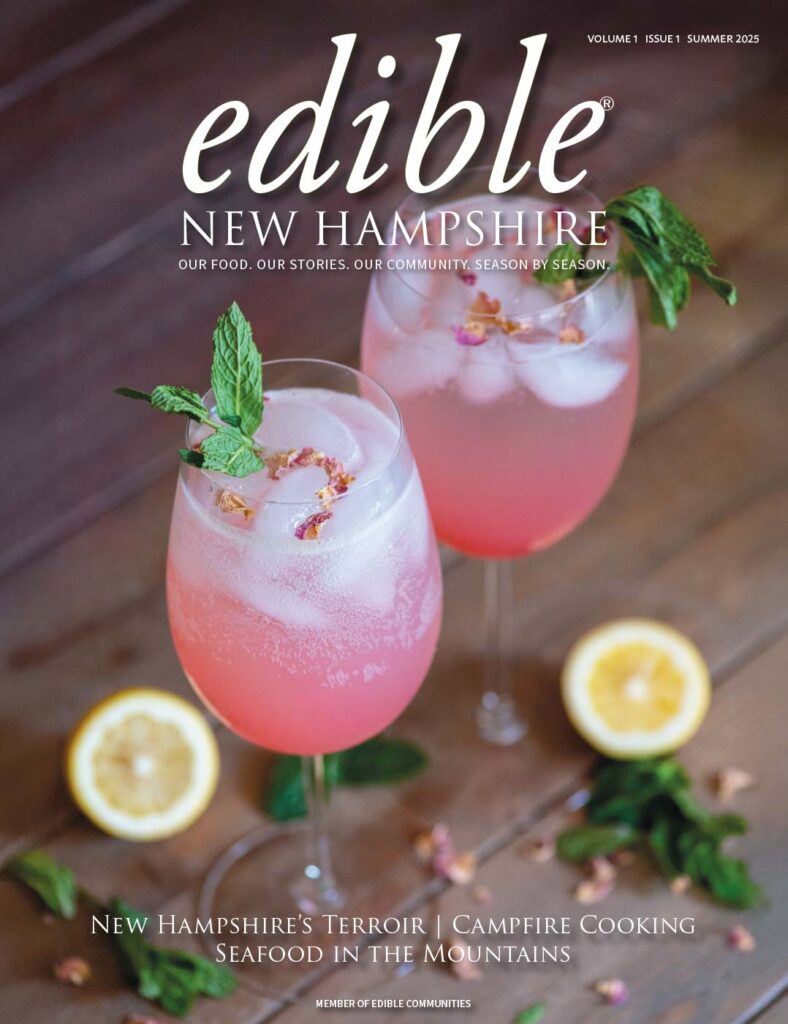Meadowstone Farm’s pick-your-own organic flower garden draws in passersby with over 25 varieties of blooms. Photo by Sam Brown.
VISITORS TO NEW HAMPSHIRE FARMS can amble through pick-your-own flower gardens bursting with color, tackle intricate mazes cut into towering cornfields, and delight in the satisfaction of farm-to-table meals served outdoors on warm summer evenings surrounded by friends. These snapshots capture the creative ways farms are providing more opportunities for guests to learn about the land they steward, a practice known as “agritourism.”
Simply put, agritourism involves activities related to a farm’s operations that promote the sale of products and enhance the public’s awareness of farming and farm life. Agritourism allows farms to diversify, therefore generating more income beyond direct sales of products alone. According to the NH Food Alliance’s 2025 “Food and Agriculture Strategic Plan,” 156 farms generated just over $4.5 million in agritourism income in 2022, an increase from years prior and “an indicator that the farm’s primary agricultural activities are no longer economically sustainable on their own.”
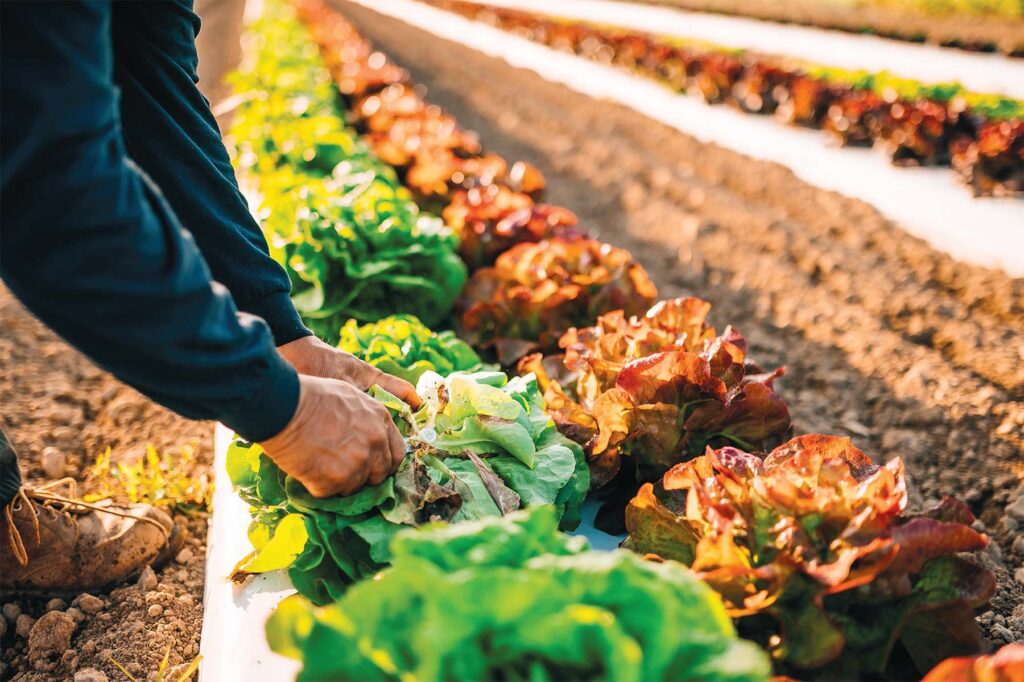
SHERMAN FAMILY FARM
“Agritourism is probably one of the fastest-growing segments of agriculture right now,” shares Michele Dutton, who owns and operates Sherman Farm in East Conway with her brother, Jeff Hatch.
“We have all finally figured out that in order to stay financially sustainable in farming, you have to offer a diverse array of products or activities. You can’t just stick to one thing.”
Celebrating its 61st year in business, Sherman Farm was opened in the spring of 1964 by Dutton’s grandparents. Their dream was to run a dairy farm, but the couple realized quickly that dairy farming wasn’t going to sustain a family of five. That’s when they decided to grow and sell vegetables in addition to dairy products. At first, her grandparents sold vegetables off a picnic table outside the farmhouse. Today, the farm features a year-round market, offering an array of farm-raised products, such as in-season vegetables, beef, and milk, alongside foods sourced from other New England farms.
“They were progressive thinkers and were not afraid to try something new,” Michele says. “And so I think that is what has led to our success in allowing us to forge our own paths as well.”
In the fall, Sherman Farm constructs one of the top-rated corn mazes in New England. But it’s more than just a maze: Guests can tackle interactive games as they navigate the 12-acre labyrinth, aptly dubbed “The Maize” (pun intended).
“The setup and the takedown is the worst part,” Michele confesses, laughing. “But to see people coming here and having fun on our land and taking in the views of the mountains and the foliage. It’s just really humbling to see other people enjoy something that we’re so passionate about.”
In the fall, Sherman Farm offers hayrides, a pick-your-own pumpkin patch, and seasonal treats, like coveted apple cider donuts. But visitors to the farm in the spring and summer will also find an ice cream shop, play area, and petting farm with goats, which Michele and family decided to open to accommodate families with young children. “We need to have a place where it’s not just stopping and shopping. We want the kids to stay.”
“We never anticipated getting so much joy from inviting the community onto the farm and essentially into our home. It feels really beautiful to be able to do that.” —Nicole Vernon, Vernon Family Farm
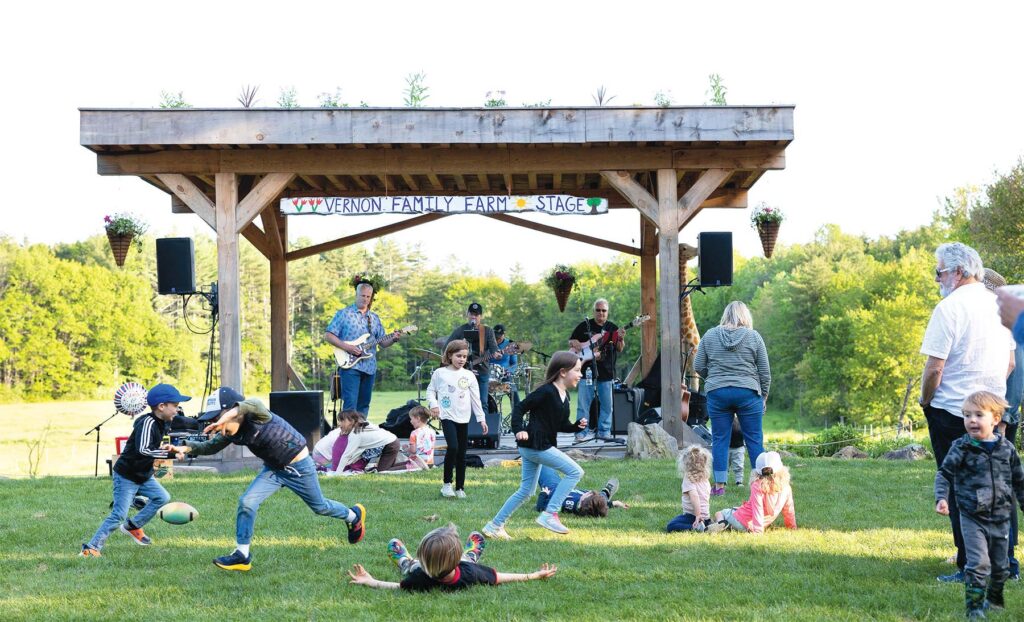
VERNON FAMILY FARM
For many farms, exposing the younger generations to farm life is a major motivator for hosting agritourism activities, especially for Nicole and Jeremiah Vernon of Vernon Family Farm in Newfields.
“I think one of the most special things about sharing this property and this farm with the community is giving all children the opportunity to be farm kids for a short while. It’s a life that is truly a blessed life for my children,” Nicole Vernon shares.
The Vernon family have offered educational agritourism activities since the farm opened 11 years ago, inviting the public into their barns to shear sheep, hold a baby lamb, or peer into the brooder, the heated house where chicks are raised.
“One of the important reasons why we incorporate agritourism is because it helps build a connection to your farmer. It’s not a life that most people live. So there’s a lot of curiosity among families and kids about how things are done, and I think it’s a really warm and inviting atmosphere,” Nicole says.
Perhaps the most popular event at Vernon Family Farm is the family-friendly, farm-to-table dinners, featuring live musical acts and their pasture-raised chicken, prepared and served in a variety of ways. “Today, I would say most folks start learning about Vernon Family Farm through our chicken,” Nicole explains. Visitors can purchase meals and tickets prior to arriving and can choose different seating options, from Adirondack chairs surrounding blazing firepits to picnic tables in view of the main stage to spacious lawn seats set back from the crowd where young children can roam.
Like Sherman Farm, Vernon Family Farm operates a farm store, or what Nicole describes as a “one-stop-shop for local food,” carrying their farm-raised chicken, pork, and lamb in addition to products from more than 50 other small family farms and local vendors across New Hampshire, Vermont, and Maine.
“We really wanted to find a farm property that was set up in such a way where having a farm store would make sense,” says Nicole, “because we were noticing that the farmers’ market model just wasn’t the best model for people shopping for food.” For many consumers, the specific date and limited time frame of a farmers’ market doesn’t provide the flexibility to shop locally on a regular basis.
“It becomes a novelty and not a routine,” she adds. “Shopping with your farmer needs to be a routine.”
“We wanted to show the community what a local farm, maybe down the street from them, does.” —Sam Brown, Meadowstone Farm

MEADOWSTONE FARM
Like Nicole, employees at Meadowstone Farm in Bethlehem find value in being present at farmers’ markets, but they chose to stop participating after 15 years in order to bring people to the farm instead. “We wanted to show the community what a local farm, maybe down the street from them, does,” says farm manager Sam Brown.
“And so we have developed a self-guided tour that folks can come and do. Anyone is welcome.” Guests can follow signs around the farm, learning about soil health, the benefits of movable greenhouses, and cheesemaking in the goat barn. It’s also advised to be on the lookout for Summer, Milton, and Buckwheat, the farm’s resident donkeys.
When Meadowstone Farm opened in 2004, owner Tim Wennrich quickly immersed himself in composting and an expansive pick-your-own blueberry patch, but he quickly recognized that there was a need for more than these two aspects of farming. He expanded the farm, bringing in chickens for eggs and growing vegetables.
Today, the crew at Meadowstone tends 10 greenhouses, raises grass-fed beef and pasture-raised pork, and composts, an aspect of the operation that marks a lovely full-circle return to the farm’s founding. “We’re in the midst of trying to develop our own potting soil to use, but we do sell and donate about 120 to 150 yards of compost every year to schools, community gardens, and homeowners who want to do their own gardening,” says Sam.
Like many farms, Meadowstone also offers three different CSA programs from mid-May to late November. CSA stands for community-supported agriculture, a type of member-based subscription where consumers pay upfront to receive a box of seasonal products. Aside from eating freshly harvested foods in season, one of the main benefits of CSA programs is knowing how and where one’s food is grown.
“I think there’s been more interest from customers in compost and growing their own food in their gardens,” says Sam, noting that after the pandemic, there was a sudden focus on sourcing local food and food resiliency in the North Country. “People would go to the grocery store and the shelves would be bare. It turned into, ‘How can northern New Hampshire feed northern New Hampshire?’ So there has been more focus on how farms can diversify but also extend the seasons a little bit more.”
One of the most notable agritourism activities at Meadowstone is a pick-your-own organic flower garden open from mid-July through the dog days of summer. The plot of land alongside the road entices passersby with more than 25 varieties of colorful blooms scattered across the landscape: stalky yellow sunflowers, lush pink dahlias, delicate purple lisianthus, and bold orange marigolds. In season, the field is open daily from 8am to 4:30pm. Flowers are sold by the pound.
And while the patch has shrunk since the farm’s inception, visitors can still pick their own blueberries, too.
“I think what is so magical and unique about this space is that kids are able to run through the wildflower meadow, and families are able to let that occur while they’re at their picnic table, eating a chicken sandwich.” —Nicole Vernon, Vernon Family Farm
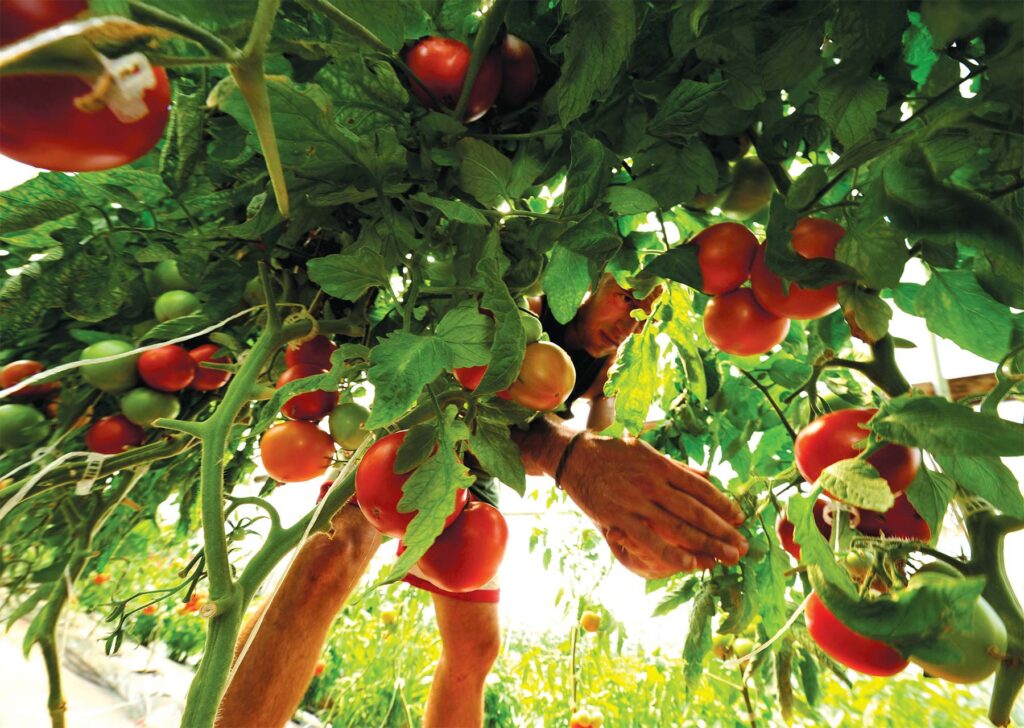
STRENGTHENING CONNECTIONS
In the end, agritourism strengthens the connections between people and the land, between people and their food, and for many farmers, this is the most rewarding aspect of the work: sharing this lifestyle with the community.
“I think what is so magical and unique about this space is that kids are able to run through the wildflower meadow, and families are able to let that occur while they’re at their picnic table, eating a chicken sandwich,” says Nicole Vernon about her family’s Newfields farm. “We never anticipated getting so much joy from inviting the community onto the farm and essentially into our home. It feels really beautiful to be able to do that.”
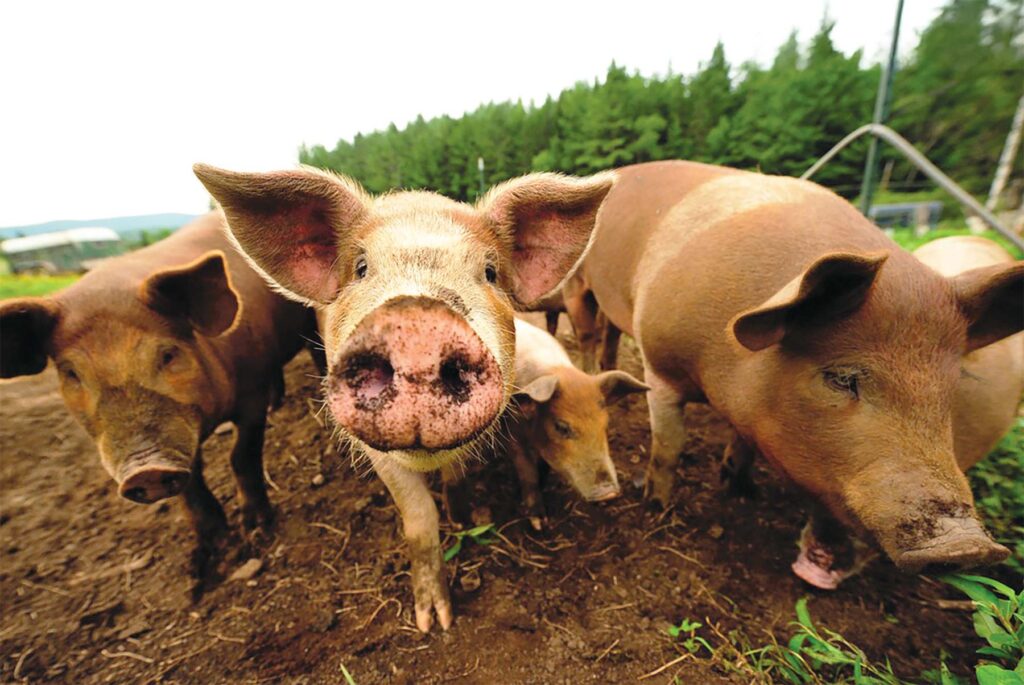
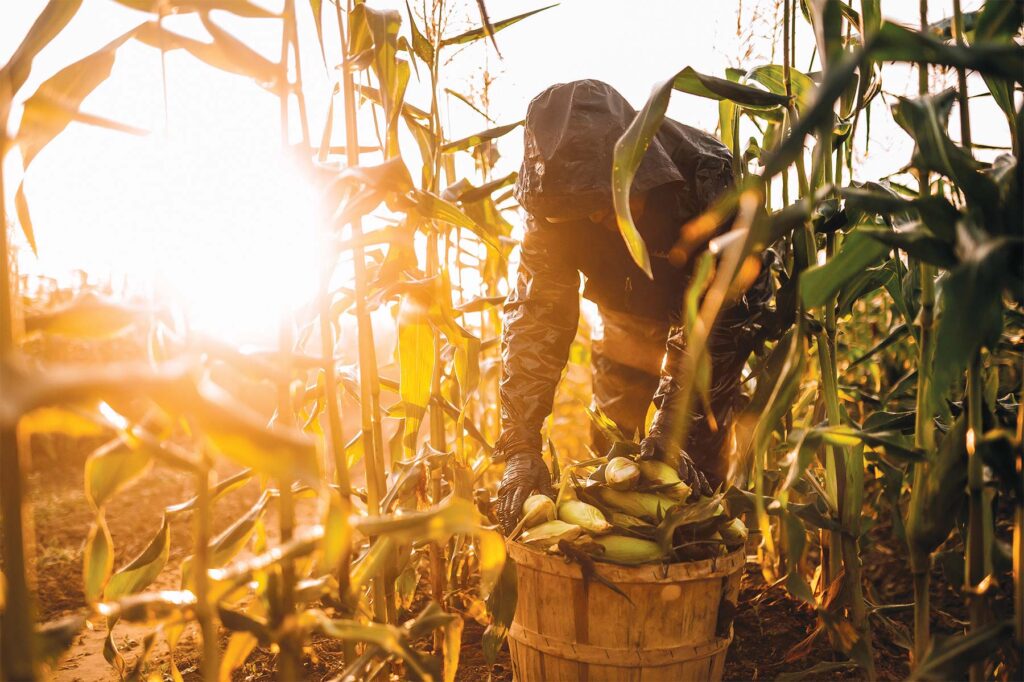
FEATURED FARMS
SHERMAN FARM
2679 East Conway Rd., Center Conway
farmer@shermanfarmnh.com
603-939-2412
shermanfarmnh.com
VERNON FAMILY FARM
301 Piscassic Rd., Newfields
info@vernonfamilyfarm.com
603-340-4321
vernonfamilyfarm.com
MEADOWSTONE FARM
809 Brook Rd., Bethlehem
info@meadowstonenh.com
603-444-0786
meadowstonenh.com
ADDITIONAL AGRITOURISM HIGHLIGHTS
BROOKFORD FARM has a corn maze; a variety of pick-your-own offerings, including strawberries and raspberries in the summer and pumpkins and root vegetables in the fall; a weeklong Sunflower Soirée; and seasonal vegetable, meat, and dairy CSA shares.
250 West Rd., Canterbury
brookfordfarminfo@gmail.com
603-742-4084
brookfordfarm.com
STONEWALL FARM has 120-plus acres of open space with vegetable gardens, pasture, animal barns, woodlands, and wetlands; farm and nature summer camps for kids; Young Farmers Internship program; Summer Night Market with live music, vendors, and food trucks.
242 Chesterfield Rd., Keene
gina@stonewallfarm.org
603-357-7278
stonewallfarm.org
TAPROOT FARM & ENVIRONMENTAL EDUCATION CENTER is home of the Taproot Marketplace and Food Hub with products from over 150 local and regional farmers, producers, artisan crafters, brewers, and vendors; cooking classes at the Marketplace kitchen; Lancaster Community Garden and other food access programs.
101 Main St., Lancaster
info@taprootnh.org
603-788-4183
taprootnh.org
Information about upcoming events, programs, and seasonal offerings can be found by visiting each farm’s website.
Visitors enjoy pick-your-own blueberries at Meadowstone Farm. Photo by Sam Brown.
